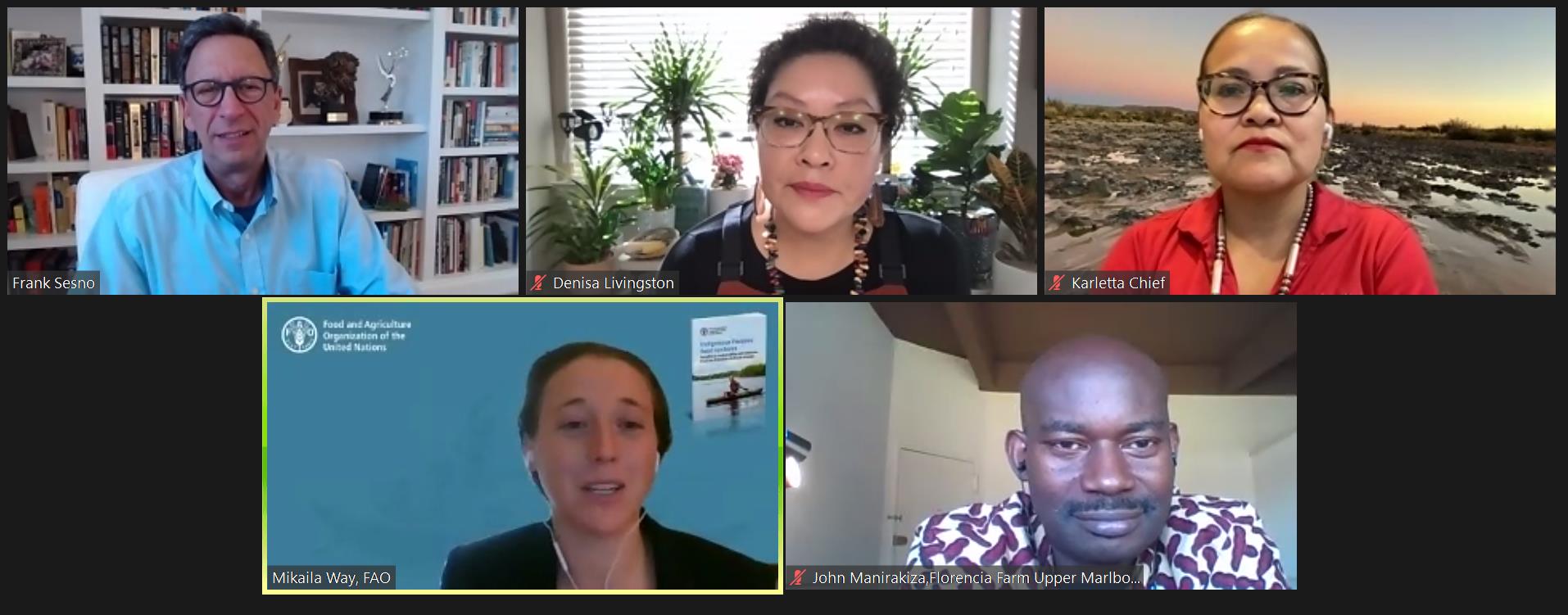How can Indigenous culture inform sustainable agriculture?

5 November 2021, Washington, DC - Highlighting how Indigenous Peoples’ knowledge can guide sustainable food systems, Planet Forward and FAO North America hosted a panel discussion featuring Indigenous leaders and experts from different areas of food and agriculture. The session, moderated by Frank Sesno, Founder of Planet Forward, accentuated how Indigenous Peoples’ knowledge of food generation and resource management can inform the creation of a sustainable food system for all, and how non-Indigenous people can listen and learn without burdening Indigenous communities with the responsibility to alleviate problems they did not create.
“As the climate talks in Glasgow take place, and as we think about how climate change is compounding the problems of feeding a growing planet, this conversation of learning from Indigenous cultures and knowledge is more relevant than ever,” said Frank Sesno in his welcoming remarks. Terrius Harris, Planet Forward-FAO Storytelling Fellow, provided an example of how this is being carried out in real-time by sharing his experiences looking at how Loko I’a, Native Hawaiian fishponds, are being revitalized by Indigenous communities of Hawaii. Harris accounted the restoration of the traditional fishponds are not only restoring coastal ecosystems they are also feeding a significant part of the local population.
Karletta Chief, Director of the new Indigenous Resilience Center at the University of Arizona, discussed how climate change has really impacted Indigenous communities in different ways. “Our livelihoods are deep within the land, and not only our livelihoods, but our identities and our beliefs,” said Dr. Chief. Further, stating that when climate change impacts Indigenous communities it is actually impacting all of the cultural connections to the land. Dr. Chief emphasized the importance of Indigenous Peoples’ foods they are higher in nutritional value and fiber, and more resilient to climate change and drought.
“The biodiversity and natural resources we have has been respected by our traditions and elders for many centuries before the new dominant food system was even established,” said John Manirakiza, Indigenous African businessman and farm manager at Florencia Farms. Manirakiza discussed how there are traditions in west African Indigenous communities of improving the soil by creating traditional compost which in turn allows more diversified and nutrient-dense crops to grow, as well as growing with no-till practices to retain the integrity of the soil. He also discussed how farming inputs from outside nature are not often used and it is important for the next generation to know how to utilize these natural alternatives available.
Denisa Livingston, Slow Food International Indigenous Councilor of the Global North and Food Justice Organizer of Dine Community Advocacy Alliance, shared the devastating impacts that uranium mines have had on Indigenous communities of the Navajo Nation and how in order to even think about growing food, the soil needs to be restored. “We need to address those injustices that have occurred to our people to be able to reincorporate healthy soil but also to learn those strategies of bioremediation,” stated Livingston. She further highlighted how the current standard way of growing and consuming food is vastly less diverse than what Indigenous Peoples’ food systems have traditionally sustained. “75 percent of what we eat comes from only 12 species,” added Livingston, stating that we could be eating 250,000-300,000 species if we looked at the tubers, insects, roots, fermentation, and different ways of growing food.
“There is a movement to go back to our traditional ways of practices and dryland farming where they optimize the amount of water used to sustain their fields,” said Dr. Chief, explaining how dryland farming is a practice that involves observing water flows through canyons and looking at areas of land that have higher deposition of sediments that contribute to soil health. “Indigenous Peoples in this region have shifted their agriculture based on the shifting ecosystems, but the boundaries that have been imposed have limited our communities to continue this practice,” she added. Manirakiza added an important perspective into how he prioritizes his production for community and environmental health above profit and yield, in his farming he values the whole system health.
Mikaila Way, Indigenous Peoples’ Liaison Officer at FAO North America, shared how, in her role, she works with member states and Indigenous Peoples to ensure that Indigenous Peoples and Indigenous Peoples systems of knowledge and rights are at the table and influencing policy. “If FAO is supposed to be a normative agency working internationally with member states to implement best policies and practices, Indigenous Peoples are key leaders and allies in that work,” she stated. Key characteristics of Indigenous Peoples’ food systems globally such as seasonality, biodiversity, circularity, and interconnectedness are among the practices and values mentioned in the discussion that can be more broadly applied to food system transformation for sustainable food generation and production.
To conclude the session, panelists went around the virtual room and shared their concluding remarks. “We need more listening from the rest of the world to invite Indigenous Peoples to the table and to redefine what they mean by regenerative or sustainable,” stated Manirakiza. “The world cannot feed itself sustainably without listening to Indigenous Peoples,” added Way quoting a key message from FAO’s recent publication on Indigenous Peoples’ food systems, encouraging people to respectfully listen, learn, and better understand.
